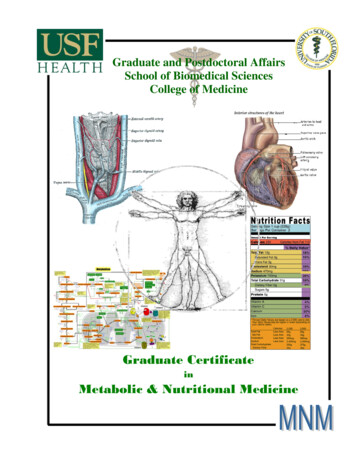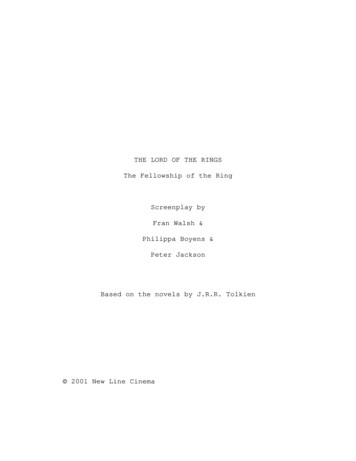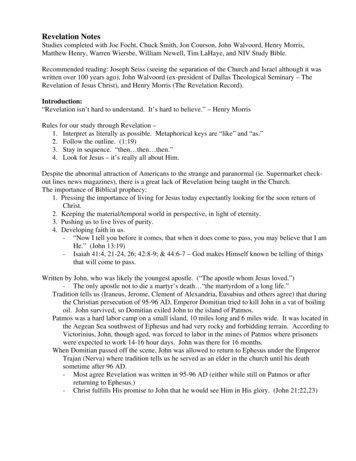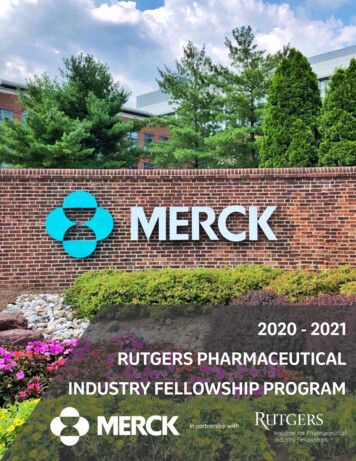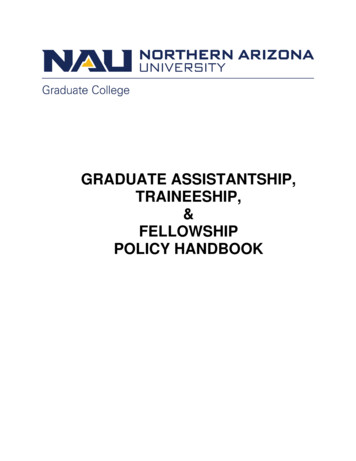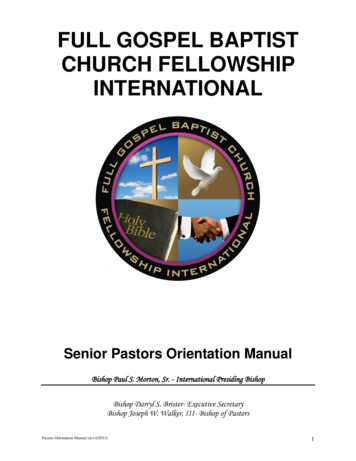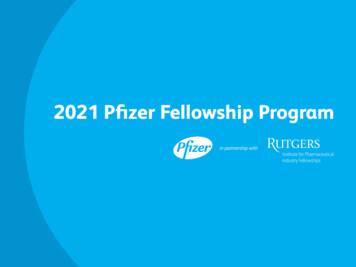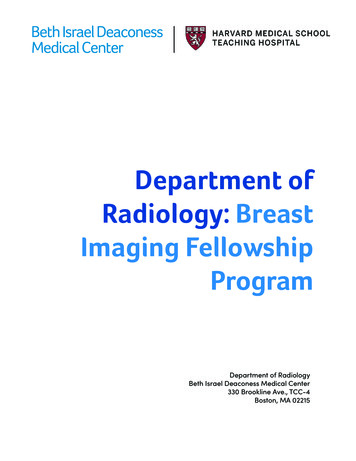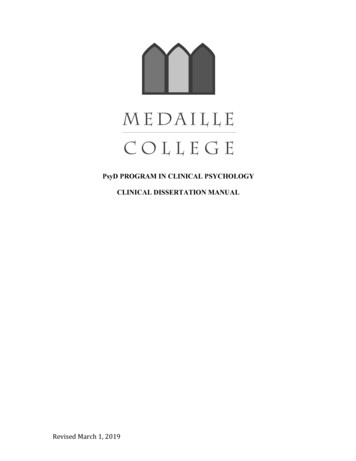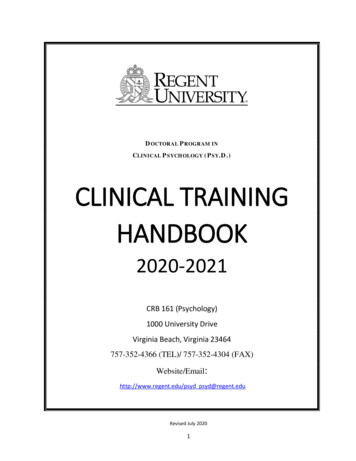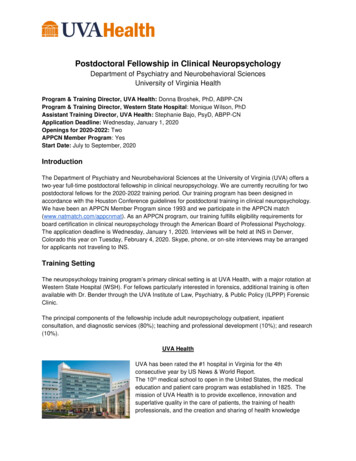
Transcription
Postdoctoral Fellowship in Clinical NeuropsychologyDepartment of Psychiatry and Neurobehavioral SciencesUniversity of Virginia HealthProgram & Training Director, UVA Health: Donna Broshek, PhD, ABPP-CNProgram & Training Director, Western State Hospital: Monique Wilson, PhDAssistant Training Director, UVA Health: Stephanie Bajo, PsyD, ABPP-CNApplication Deadline: Wednesday, January 1, 2020Openings for 2020-2022: TwoAPPCN Member Program: YesStart Date: July to September, 2020IntroductionThe Department of Psychiatry and Neurobehavioral Sciences at the University of Virginia (UVA) offers atwo-year full-time postdoctoral fellowship in clinical neuropsychology. We are currently recruiting for twopostdoctoral fellows for the 2020-2022 training period. Our training program has been designed inaccordance with the Houston Conference guidelines for postdoctoral training in clinical neuropsychology.We have been an APPCN Member Program since 1993 and we participate in the APPCN match(www.natmatch.com/appcnmat). As an APPCN program, our training fulfills eligibility requirements forboard certification in clinical neuropsychology through the American Board of Professional Psychology.The application deadline is Wednesday, January 1, 2020. Interviews will be held at INS in Denver,Colorado this year on Tuesday, February 4, 2020. Skype, phone, or on-site interviews may be arrangedfor applicants not traveling to INS.Training SettingThe neuropsychology training program’s primary clinical setting is at UVA Health, with a major rotation atWestern State Hospital (WSH). For fellows particularly interested in forensics, additional training is oftenavailable with Dr. Bender through the UVA Institute of Law, Psychiatry, & Public Policy (ILPPP) ForensicClinic.The principal components of the fellowship include adult neuropsychology outpatient, inpatientconsultation, and diagnostic services (80%); teaching and professional development (10%); and research(10%).UVA HealthUVA has been rated the #1 hospital in Virginia for the 4thconsecutive year by US News & World Report.The 10th medical school to open in the United States, the medicaleducation and patient care program was established in 1825. Themission of UVA Health is to provide excellence, innovation andsuperlative quality in the care of patients, the training of healthprofessionals, and the creation and sharing of health knowledge
within a culture that promotes equity, diversity, and inclusiveness. The Graduate Medical Educationaltraining program oversees the training of more than 800 residents or fellows in 82 specialties, subspecialties, and training programs, including postdoctoral training in clinical psychology specialties suchas neuropsychology.Western State HospitalEstablished in 1825 as the 2nd mental health facility in Virginia, WSH isa state psychiatric hospital with a mission of providing safe andeffective individualized treatment in a recovery focused environment.UVA expanded its affiliation with WSH in 1978 and established trainingrotations and other academic affiliations. In 1990, the hospital receivedthe first National Award from the American Psychiatric Association asthe exemplary program in collaborative services between a publicmental health facility and a university. Housed in a new state of the art facility, WSH is located in theShenandoah Valley and is a 40 minute scenic drive from Charlottesville.Patient PopulationUVA Health Neuropsychology Assessment ClinicWe primarily conduct outpatient neuropsychological assessment of adults with neurological,neuropsychiatric, and complex medical disorders. We have three full-time psychometrists who administerneuropsychological testing. We staff several specialty clinics/services (listed below) and work closely withcolleagues from multiple disciplines.Our primary populations include: concussion/TBI (including sport concussion), epilepsy, functionalneurologic disorders (including psychogenic non-epileptic spells), student-athletes, and solid organtransplant (lung, liver, and kidney) candidates. We additionally see a wide range of other conditions,including autoimmune and infectious disorders (e.g., HIV/AIDS and encephalitis), early-onset/atypicaldementias, medication- or substance-induced cognitive impairment, hypoxic/anoxic brain injury,cerebrovascular disease, sleep disorders, psychiatric comorbidity, postoperative cognitive dysfunction,and neurodevelopmental disorders. With the exception of individuals with TBI, epilepsy, or organtransplant, we do not typically see patients over the age of 65.Fellows will gain experience with issues related to secondary gain and performance validity testing, mostoften in the context of concussion/TBI. There are opportunities to complete independent medical, fitnessfor duty, and other forensic evaluations with Drs. Bender and Bajo. In addition to outpatient experiences,fellows are on-call 1-2 days per week (only during normal business hours) for inpatient consults, the vastmajority of which are for PNES or expedited lung transplant evaluation.F.E. Dreifuss Comprehensive Epilepsy Program: We conduct pre- and post-surgical evaluations forepilepsy patients as part of UVA’s Level 4 comprehensive epilepsy program. Fellows gain experiencepresenting neuropsychology findings to a multidisciplinary team consisting of neurology/epileptology,neurosurgery, neuroradiology, psychiatry, and nursing during the weekly epilepsy surgical conference.There are numerous opportunities to observe Wada procedure, cortical mapping, and neurosurgery. Seemore at https://uvahealth.com/services/epilepsy.
Acute Concussion Evaluation (ACE) Clinic: Fellows complete a rotation in the weekly ACE Clinic, amultidisciplinary clinic staffed by us, a neurologist, a neurology nurse practitioner, and an occupationaltherapist. ACE is a half-day consultative clinic for individuals who experienced a concussion or mild TBIwithin the last 6 months. We conduct clinical interviews and provide education to patients on concussionrecovery and symptom management. Neuropsychological testing is not administered in ACE, but patientsare sometimes referred to our main clinic for comprehensive assessment. See more oncussion-evaluation-clinicLung Transplant Team: We see every patient who is being considered for lung transplant to evaluatetheir cognitive abilities, emotional functioning, understanding of transplant, motivation and willingness,and aftercare plan. Based on our results, we identify and provide recommendations for potentialneuropsychological concerns that could impact transplant outcome. We participate in the weekly lungtransplant selection committee meeting. The lung transplant service has a highly coordinatedmultidisciplinary team that includes pulmonologists, surgeons, social work, nurses and nursecoordinators, dieticians, pharmacists, and physical therapists. We also see potential transplantcandidates on an inpatient basis when they are admitted to the hospital for expedited work-up due torapidly declining pulmonary status.Epilepsy Monitoring Unit (EMU) Consult Service: We are consulted when individuals admitted to theEMU are diagnosed with non-epileptic spells. We conduct psychodiagnostic interviews to assess for riskfactors for psychogenic non-epileptic spells (PNES), and we provide patient and family education andtreatment recommendations.UVA Athletics Department: We conduct screening assessments and comprehensive psychoeducationalevaluations for UVA Division I student-athletes. Common referral questions include ADHD and learningdisorders. We also occasionally see athletes for concussion-related evaluation and comprehensiveevaluation to inform decisions about medical retirement secondary to multiple sports related concussions.Western State Hospital Neuropsychology ServiceAs a state psychiatric hospital, WSH provides care primarily to individuals with serious mental illness(e.g., schizophrenia spectrum, bipolar disorder, severe depression, substance-induced psychosis). Manypatients have some degree of developmental delay or intellectual disability. A sizeable minority of patientshave psychotic symptoms secondary to neurological and neurodegenerative conditions, such as deliriumand dementia with Lewy bodies. Patients often have legal charges and many are at WSH for restorationof competency to stand trial. Common referral questions include assessing for cognitive barriers torestoration of trial competence, differential diagnosis of primary versus secondary psychiatric disorders,and evaluation for substance-related cognitive impairment (e.g., Wernicke-Korsakoff). Fellows gainexperience with forensic issues and assessment of performance and symptom validity. There is a full-timepsychometrist who completes all testing. Fellows are observed conducting interviews and can observetheir patients testing through a two-way mirror.Cognitive Screening Clinic: Fellows conduct brief interviews and cognitive testing with WSH patientsduring the weekly Screening Clinic to identify those who may benefit from full evaluation. This clinic givesfellows an opportunity to see patients with a wide range of presenting issues and acuity levels, and toprovide brief feedback to the patient and treatment team.
Weekly ScheduleExample Schedule While at UVA Full-Time16 months8 amMondayClinic MeetingTuesdayWednesdayAthleteEvaluation9 am10 amPatient AInterview OnlyPatient C FullEvaluationLung TransplantEvaluationFridayPatient D FullEvaluation (8-9)ORACE ClinicEpilepsyConferencePrep MeetingPatient BInterview Only1 pm2 pmEpilepsy SurgeryConferencePNES InpatientConsult11 am12 pmPatient ATesting (w/ tech)Thursday*Supervision withAttendingNeurologyGrand RoundsSupervision ofExternFeedbackSession3 pmClinic JournalClubFeedbackSession4 pmNeuropsychologySeminar Series*The Lung Transplant Selection Committee Meeting is Thursdays at 7:30 am.Example Schedule During WSH Rotation3 days at WSH for 4 months, then 2 days at WSH for 4 months8 am9 amMondayWSHTuesdayWSHWednesdayWSHPrep for andDiscuss PatientPrep for andDiscuss PatientPatient InterviewPatient InterviewScreening ClinicSupervision withAttendingSupervision ofExternThursdayUVAFridayUVA10 am11 am12 pm1 pm2 pmPsychiatryGrand RoundsFeedbackSessionFeedbackSessionUVA ThursdayScheduleUVA FridaySchedule (noACE)
3 pm4 pmForensic CaseConferenceSupervisionFellows typically work with each attending faculty weekly. Training is individualized and developmental,and is designed to prepare fellows for independent practice. Fellows are treated as junior colleagues andare an integral part of our clinic. Depending on their level of experience with various patient populations,fellows initially observe or co-interview with faculty. As fellows gain experience in our clinic, they areexpected to independently conduct clinical interviews and feedbacks, coordinate with other providers, andtake a primary role in all aspects of a patient’s care. During the first year, weekly structured supervision isprovided, in addition to case-by-case as-needed discussion. As fellows progress through their first yearand into their second year, supervision becomes less structured and more akin to consultation. Secondyear fellows take on more administrative tasks necessary for running a neuropsychology clinic, andprovide training to first-year fellows. Fellows also provide formal tiered supervision to psychologypracticum students and medical/psychiatry residents completing a rotation in our clinic.Didactics and EducationClinic Journal Club/Didactic: Our clinic holds a weekly meeting to discuss relevant articles, currenttopics in the field, quality improvement projects, and interesting clinical cases.Neuropsychology Seminar Series: Neuropsychology fellows from the Departments of Psychiatry andNeurology meet once a week for a seminar series designed to prepare fellows for board certification inneuropsychology. Speakers are brought in from other departments and institutions to cover a wide rangeof neuropsychology, neurology, and professional development topics. Fellows are required to presentonce per training year on topics readily utilized in the clinical practice of neuropsychology which canassist attendees in board preparation (e.g., neuroanatomy; clinical syndromes; interesting casepresentations). Additionally, each fellow completes a full mock ABPP exam, including written exam, factfinding, and work sample defense, administered by faculty members who also serve as ABPP examiners.Neurology Grand Rounds: We typically attend the weekly Department of Neurology Grand Rounds.Examples of presentation topics within the past 6-months include Interactions of Sleep and Epilepsy;Parkinson’s disease and DBS: Neuropsychological assessment and non-motor outcomes; Unlocking thepathophysiology of SUDEP; Islam and health issues; Walk this way: Music and Parkinson’s disease;Neurological complications of cancer immunotherapy; and Radiation neurotoxicity in lower grade gliomas:The good the bad and the ugly.Medical Psychology Fellows’ Seminar: Fellows attend a monthly professional development seminarseries with the behavioral medicine and forensic psychology fellows in the Department of Psychiatry andNeurobehavioral Sciences. Dr. Amit Shahane, Director of the UVA Medical Psychology FellowshipProgram, coordinates this monthly seminar.Medical Neuroscience Course: Second-year fellows have the opportunity to audit selected portions ofthe Medical Neuroscience course in the UVA medical school curriculum.
Additional optional didactic opportunities: UVA Psychiatry Grand Rounds, WSH Grand Rounds, UVANeuropathology Rounds (brain cuttings), UVA Neuroradiology Rounds, UCSD web didactic series, ILPPPforensic case series, joint journal club with the Exercise and Sport Injury Laboratory in the Department ofKinesiology.There are numerous opportunities to present during grand rounds/departmental meetings, or to guestlecture in graduate classes.ResearchParticipation in research is not a major focus of our clinical fellowship, but fellows are expected toparticipate in academic activity. Opportunities include participating in independent or ongoing clinicalresearch, co-reviewing articles with a faculty member for a variety of academic journals, writing casestudies, and more. Collaborative research with our colleagues in Kinesiology and access to the sportsconcussion database is an excellent opportunity for projects related to sports concussion. Collaborationswith our academic colleagues in the epilepsy program and other medical specialties are also available. AtWSH, the longstanding neuropsychology database provides rich opportunities for research. While there isno protected research time, fellows typically maximize research opportunities during gaps in the clinicalschedule (e.g., no-shows, cancellations).FacultyDonna K. Broshek, PhD, ABPP-CNDr. Broshek is the John Edward Fowler Professor at the UVA School of Medicine with a primaryappointment in Psychiatry and Neurobehavioral Sciences, where she is Director of theNeuropsychology Assessment Clinic and Chief of Psychological Services. She is also Director of theBrain Injury and Sports Concussion Center within the UVA Brain Institute and Co-Director of theAcute Concussion Evaluation Clinic. Clinically, Dr. Broshek sees a large volume of patients withsports concussion, mild to moderate traumatic brain injury and persisting post-concussion symptoms,as well as patients with intractable epilepsy and a variety of other neurologic and medical conditions.She is a member of the Concussion Committee for the NBA and WNBA. She is a Fellow of theNational Academy of Neuropsychology and the Sports Neuropsychology Society, Immediate PastPresident of the Sports Neuropsychology Society, Executive Committee Member of the Athlete BrainHealth Foundation, and a member of the Professional Advisory Board for the Epilepsy Foundation.She has been active in research on sports concussion and mTBI, as well as national clinical trials forthe treatment of intractable epilepsy. Dr. Broshek has been active at the local, regional, and nationallevels in promoting concussion education and safety. In 2014, Dr. Broshek was recognized with theMaster Educator Award through the UVA Graduate Medical Education Program after nomination byher fellows; she is the only psychologist and non-MD faculty in the School of Medicine to have beenawarded this distinction. In 2019, she was awarded the Distinguished Service Award by the NationalAcademy of Neuropsychology.Stephanie D. Bajo, PsyD, ABPP-CNDr. Bajo is an Assistant Professor at the UVA School of Medicine, with a primary appointment in theDepartment of Psychiatry and Neurobehavioral Sciences, where she also serves as Assistant TrainingDirector of the neuropsychology fellowship program. Dr. Bajo completed her neuropsychology fellowshipat University of Virginia/Western State Hospital and subsequently joined the faculty at UVA in 2016.Clinically, she sees patients with a range of medical, neurological, and psychological co-morbidities,
although primary clinical interests include concussion/TBI, epilepsy, infectious disease, and functionalneurological disorders (FND). As an equestrian, she also has a specific clinical and research focus insports concussion related to horse-back riding. Dr. Bajo conducts forensic neuropsychologicalassessments, including Worker’s Compensation evaluations, Independent Medical Examinations (IME),and Fitness for Duty (FFD) evaluations. She also heads the Spells Workup Assessment Team (SWAT),which is an inpatient consult service dedicated to providing targeted clinical interviews to patientsdiagnosed with Non-Epileptic Spells (NES) while admitted to the Epilepsy Monitoring Unit. Outside of herrole at UVA, Dr. Bajo serves as a co-chair on the Legislative Action and Advocacy Committee (LAAC)through the National Academy of Neuropsychology (NAN).Scott D. Bender, PhD, ABPP-CNDr. Bender is an Associate Professor of Psychiatry & Neurobehavioral Science at the UVA School ofMedicine. He obtained his PhD at the University of North Texas where he began his studies ofmalingering detection under the mentorship of Richard Rogers, PhD. After completing his internship inclinical neuropsychology at Yale University in 2000, Dr. Bender completed his postdoctoral fellowship inthe department of Neurology at the University of Virginia. He joined the UVA department of Psychiatryand the Neurocognitive Assessment Lab in 2002 and has been with the Department’s Institute of Law,Psychiatry & Public Policy since 2005. His primary duties include conducting clinical and forensicneuropsychological evaluations, teaching, and publishing manuscripts. His areas of research involvedifferential diagnosis of malingering and the effects of traumatic brain injury (particularly mild TBI) onneurocognitive and emotional functioning. He is frequently called to testify in legal cases and hasauthored multiple published manuscripts, articles, and chapters. He is co-editor of the 4th edition ofClinical Assessment of Malingering and Deception.Monique Wilson, PhDDr. Wilson is Director of Behavioral Medicine at WSH and adjunct Assistant Professor of Psychiatry andNeurobehavioral Sciences at UVA. She provides psychological and neuropsychological assessment andtreatment of patients with comorbid neurological and psychiatric illness; consultation with staff, family andpatients; and management of cognitive rehabilitation treatment for hospital-wide psychosocialrehabilitation program. Research and scholarly interests include neurocognitive effects of chronicpsychological stress, issues related to culture/ethnicity and efficacy of normative data, professionaldiversity in the field of neuropsychology. Dr. Wilson serves as Chair of the Virginia Brain Injury Counciland is a member of the APPCN Committee on Diversity and Inclusion.Bernice A. Marcopulos, PhD, ABPP-CN, Adjunct FacultyDr. Marcopulos is Professor of Psychology
Acute Concussion Evaluation (ACE) Clinic: Fellows complete a rotation in the weekly ACE Clinic, a multidisciplinary clinic staffed by us, a neurologist, a neurology nurse practitioner, and an occupational therapist. ACE is a half-day consultative clinic for individuals who exper
